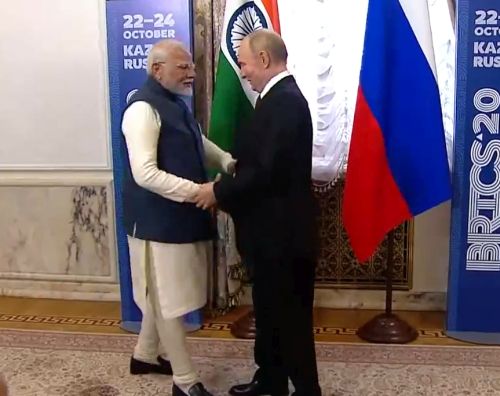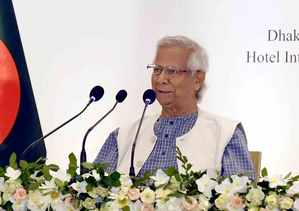International
IANS Analysis: CPEC – A bane for China?
New Delhi, June 24 (IANS) The China-Pakistan Economic Corridor (CPEC), announced in 2015 subsequent to Pakistan’s engagement with China’s Belt and Road Initiative (BRI) in 2013, represents a considerable collaborative venture. Originally valued at $46 billion, the project focuses on sectors such as energy, transportation, and industry, aiming to connect China’s Kashgar in northeastern Xinjiang with Gwadar port in Pakistan’s Balochistan province across approximately 3,000 kilometers.
Subsequently, CPEC, often referred to as a ‘flagship project’, escalated into a $62 billion initiative projected for completion by 2030.
At the time of its announcement, Pakistan was grappling with a precarious economic condition characterised by a shortage of Foreign Direct Investment, significant electricity deficits, macroeconomic instability, and a severe internal security crisis due to terrorist activities.
Consequently, CPEC was perceived as a transformative element for Islamabad’s economic framework.
For China, the successful completion of CPEC promises enhanced access to the Indian Ocean and beyond.
Some experts believe that the project was also anticipated to mitigate separatist tensions in Xinjiang through increased infrastructural development and connectivity with Pakistan. Nonetheless, nearly nine years post-launch, the progress of projects under CPEC has fallen significantly short of its objectives, raising severe concerns regarding its actual benefit to China.
To date, Chinese investment in the China-Pakistan Economic Corridor has reached approximately $25 billion.
Of the 122 projects initially announced under CPEC, only 36 have been completed. Although CPEC was envisioned as a transformative force for Pakistan’s economy, it has not succeeded in alleviating Islamabad’s economic troubles.
Furthermore, the projects have been marred by allegations of corruption within Pakistan, including reports that Chinese investors were assured significant annual returns on their investments.
Additionally, the suspension of several CPEC projects in 2018 during Imran Khan’s administration contributed to Beijing’s frustration.
Concurrently, Pakistan’s total debt to China has escalated to $30 billion, exacerbating its economic challenges, which remain unaddressed despite the initiation of numerous CPEC projects.
The primary endeavor of the CPEC, the development of Gwadar port, has been embroiled in controversy due to Pakistan’s apparent neglect of the interests of local Gwadar residents and Baloch nationalist groups.
This oversight has precipitated increasing resentment within the province, exemplified by the emergence of the Gwadar Haq Do Tehreek (Gwadar Rights Movement).
Despite being declared ‘fully operational’ in 2021, Gwadar port has attracted minimal traffic and has underperformed compared to smaller ports, failing to secure any regularly scheduled deep-sea lines, thereby generating no significant cargo revenue for Pakistan or China.
In addition to its lackluster performance, political and economic instability in Balochistan; one of Pakistan’s most impoverished regions, has severely impeded the port’s potential as CPEC’s “game changer”.
This situation has intensified major unrest among natives and separatist groups in Balochistan, who demand a greater share in CPEC’s benefits. Chinese officials have repeatedly voiced concerns to Pakistan, emphasizing that the success of CPEC hinges on improving the conditions in Gwadar and alleviating poverty in Balochistan.
The frequent attacks on Chinese nationals involved in CPEC projects by insurgents have further decelerated progress, leading to significant investment losses and heightened security concerns for China.
Whether dealing with isolated terrorist incidents or orchestrated attacks targeting Chinese interests, Beijing is confronting diminishing returns from CPEC amid escalating security risks to its nationals in Pakistan.
This growing concern has compelled China to press Pakistan to prioritise addressing Beijing’s security apprehensions, highlighting a primary challenge in advancing CPEC initiatives.
The ambitious vision of the China-Pakistan Economic Corridor in a country grappling with economic and political challenges, such as Pakistan, has proven costly for Beijing.
In response to security concerns for its investments near the Wakhan Corridor compromised by Pakistan’s inability to secure the safety of Chinese nationals, China had resolved to expand CPEC into Afghanistan in May of the previous year, thereby incorporating the Taliban-led government into this flagship initiative.
This decision to seek alternatives, particularly with the Taliban regime, arises from Pakistan’s consistent failure to safeguard Chinese personnel and its ongoing issue with cross-border terrorism.
Nonetheless, this strategic shift appears to counteract Beijing’s initial intentions, as China now faces security issues in Taliban-controlled Afghanistan, notably concerning attacks by Pakistani militant groups like Tehreek-i-Taliban Pakistan (TTP) and other factions such as Islamic State-Khorasan (ISIS-K), which is a staunch adversary of the Taliban, threatening Chinese interests in the region.
Pakistan’s Prime Minister Shehbaz Sharif undertook a five-day visit to Beijing in early June 2024 with the objective of soliciting foreign investment to alleviate Pakistan’s financial distress, was perceived as an attempt to rejuvenate the CPEC.
During this visit, both nations agreed to progress CPEC to its second phase, despite the incomplete status of the majority of Phase I projects.
However, it is widely believed that Sharif’s commitments to enhance security for these projects did not sufficiently reassure China, considering previous experiences.
Notably, despite the declaration of upgrading CPEC, Sharif was unable to secure any new investments or debt restructuring arrangements from Beijing as anticipated.
Just days prior to the visit, Islamabad’s plea for an additional $17 billion to support nine infrastructure and energy projects, along with a $15 billion debt restructuring proposal, received a tepid response from Beijing.
This reflects China’s definite scepticism regarding Pakistan’s management of economic and security issues.
Furthermore, reports suggest that Pakistan plans to reallocate CPEC funds towards military activities along the Indian border, indicating a blatant disregard for both China’s security concerns and its own economic predicaments.
Evidently, the ambitious CPEC has become a strategic liability for China, presenting a complex challenge that it struggles to resolve.
Not surprising, an article in ‘The Diplomat’ claims that China had been upset with Pakistan and has subsequently downgraded Pakistan’s status from ‘Highest Priority’ to just ‘Priority’.
Regardless of the veracity of the claims made in ‘The Diplomat’ article, Pakistan has seen its relations with China and Afghanistan turn cold recently owing to its turbulent internal security dynamics.
–IANS
scor/
International
Lee Hsien Yang seeks refuge in United Kingdom

Lee Hsien Yang, the youngest son of Singapore’s founding father, the late Lee Kuan Yew, announced on Tuesday that he is now a political refugee in the United Kingdom after seeking asylum from the British government “as a last resort.”
“I remain a Singapore citizen and hope that someday it will be safe to return home,” Lee stated in a Facebook post, as reported by Channel News Asia (CNA).
Citing what he described as the Singapore government’s “attacks” against him, Lee, who is the younger brother of former Prime Minister Lee Hsien Loong, revealed that he sought asylum protection in 2022.
Lee Hsien Yang and his late sister, Lee Wei Ling, who passed away earlier this month, have been in conflict with their brother Lee Hsien Loong over the fate of their father’s home following his death in 2015, resulting in a public dispute that has estranged the siblings.
In an interview with the UK-based newspaper The Guardian, Lee alleged that a “campaign of persecution” compelled him to seek asylum in Britain.
In response to his claims, the Singapore government stated that there is “no basis” for his allegations of “a campaign of persecution” or other assertions regarding political repression in the country.
“Singapore’s judiciary is impartial and makes decisions independently. This is why Singaporeans have a high level of trust in the judiciary,” a government spokesperson remarked.
The spokesperson added that there are no legal restrictions preventing Lee and his wife, lawyer Lee Suet Fern, from returning to Singapore. “They are and have always been free to return to Singapore,” the spokesperson said.
Lee and his wife have been outside of Singapore since 2022, having opted not to attend a scheduled police interview regarding potential offenses related to providing false evidence in judicial proceedings concerning their father’s will and the family home.
Lee and his late sister, who had been living at the property, alleged they felt threatened while trying to fulfill their father’s wish to demolish the house. They also accused their elder brother, former Prime Minister Lee Hsien Loong, of abusing his governmental influence to advance his personal agenda.
International
Indo-Russian ties are stronger than ever before at BRICS

Kazan, Russia: Prime Minister Narendra Modi held a bilateral meeting with Russian President Vladimir Putin on the sidelines of the 16th BRICS Summit.
During the meeting, President Putin remarked, “I recall our meeting in July, where we had productive discussions on various issues. We’ve also spoken over the phone several times. I am very grateful you accepted the invitation to come to Kazan. Today, we will attend the BRICS Summit’s opening ceremony, followed by dinner.”
PM Modi responded by expressing his appreciation, saying, “I sincerely thank you for your friendship, warm welcome, and hospitality. It’s a great pleasure to visit such a beautiful city as Kazan for the BRICS Summit. India shares deep historical ties with this city, and the opening of our new embassy here will further strengthen these connections.”
International
Laos seeks to enhance nutrition amid climate change concerns

Vientiane (Laos), Aug 22 (IANS) Representatives from the Lao government and development partners have attended a conference here titled “Climate Change and Nutrition in Laos: Intersections and Interventions” to discuss the impact of climate change on nutrition in the Southeast Asia country and potential solutions.
Speaking at the conference, deputy director general of the Department of Hygiene and Health Promotion under the Lao Ministry of Health Viengkhan Phixay, said, “We gather to address a critical and interwoven issue: the impact of climate change on nutrition and how we can work together to tackle these challenges,” Xinhua news agency reported.
The Lao government is actively engaged in this endeavor, with numerous policies and initiatives aimed at addressing both climate change and nutrition, Lao National Television reported on Thursday.
“By leveraging the Scaling Up Nutrition network in Laos, which is led by the government, and supported by civil society, donors, and the United Nations, we have a robust platform to tackle the negative impacts of climate change while improving nutrition and overall health for everyone in Laos,” Viengkham said at the conference held on Monday.
The conference featured a series of presentations that not only detailed evidence-based research but also introduced innovative tools for measuring and enhancing nutrition under the impact of climate change.
The conference stressed the critical need for integrated approaches to tackle the intertwined challenges of climate change and nutrition, and setting the stage for impactful future collaborations.
–IANS
int/psd
International
One killed, seven injured in shootout in Iraq

Baghdad, Aug 22 (IANS) A civilian was killed while seven others were injured on Thursday in a tribal shootout in Iraq’s holy Shiite province of Najaf, according to a local security source.
The shootout erupted in the early hours between armed men from the local tribe in the al-Zarga area in northern Najaf, some 160 km south of Baghdad, a local police officer told Xinhua on condition of anonymity.
The clash resulted in the killing of an Iraqi civilian and the injury of seven others, including three Iranian Shiite pilgrims, the source added.
A joint force from the Interior Ministry’s emergency response division and Najaf provincial police arrested 53 gunmen from both sides of the shootout and seized weapons and ammunition, the Interior Ministry said in a statement.
It added that search operations are ongoing to locate additional gunmen and weapons, with more details to be released later.
The incident took place as numerous pilgrims traveled to the city of Karbala to observe Arbaeen, which marks the end of a 40-day mourning period for the killing of Imam Hussein, the grandson of Prophet Muhammad, in the Battle of Karbala in 680 A.D.
Typically, these pilgrims also visit Najaf as part of their journey to Karbala.
–IANS
int/jk/arm
International
Bangladesh seeks $1 billion budget support from World Bank

Dhaka, Aug 22 (IANS) Bangladesh’s interim government has sought $1 billion from the World Bank as budgetary support.
The call came from the country’s Power, Energy and Mineral Resources Adviser Muhammad Fouzul Kabir Khan’s meeting with Abdoulaye Seck, the World Bank’s Country Director for Bangladesh and Bhutan, in Dhaka on Wednesday.
He made the plea as the ministry owes more than 2 billion dollars to suppliers in import costs of power and energy, Xinhua news agency reported.
Khan mentioned that the interim government, which was formed with many pressing mandates, is due to settle a $2 billion debt left by the previous government in the power sector.
He said they have already suspended activities under the much-criticized Quick Enhancement of Electricity and Energy Supply Act 2010 and abolished the government’s power to set energy prices without any public hearing.
On August 5, the former Prime Minister of Bangladesh, Sheikh Hasina, was ousted from her country and power, ending her rule since January 2009.
This event was seen as a massive escalation, with what initially started as student’s protests and resulted in a major crisis in Bangladesh.
Earlier on August 8, Nobel laureate Muhammad Yunus took oath as the head of Bangladesh’s interim government.
–IANS
int/jk/as
-
Video2 years ago
PM Modi Attacks Congress in Karnataka with “Kerala Story”
-
Politics2 years ago
Siddaramaiah & DK Shivakumar sworn in as Chief Minister & Deputy CM respectively
-
Cricket2 years ago
CSK players rejoice 5th IPL title with their families (Pics)
-
Entertainment2 years ago
Karan Deol weds his longtime Girlfriend Drisha Acharya (Pics)
-
Sports7 years ago
History Of Official FIFA WORLD CUP Match balls
-
India2 years ago
Ashwini Vaishnaw: Railway Board recommends CBI probe in the Odisha railway disaster
-
Entertainment2 years ago
Urvashi Rautela dazzles on Cannes 2023 red carpet (Pics)
-
Entertainment2 years ago
Sunny Leone gets ready for Kennedy premiere in Cannes (Pics)






























